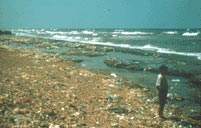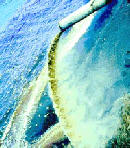|
According to UNEP's Assessment of Transboundary Pollution Issues in the Mediterranean Sea, every year about 55 tons of lindane — a substance forbidden within the EU in the early 1990s — are poured in the sea. Lindane is one of the so-called POPs (persistent organic pollutants), a group of 12 extremely toxic pesticides and industrial chemicals including PCBs, dioxins, and DDT. Reported affects of these chemicals include carcinogenic, immunodepressant, and endocrine disruption activities in both animal and humans.
"The data provided by UNEP give, for the first time, a complete picture of the threats posed to marine life and humans in the mare nostrum. The presence of highly polluting substances in the Mediterranean is all the more dangerous, as it is an enclosed sea where almost a century is needed to renew the water," declared Paolo Guglielmi, Head of the Marine Unit at WWF's Mediterranean Programme.
According to the UNEP report’s estimates, France has released the highest amounts of chlorinated pesticides, except for lindane, in the Mediterranean. Italy holds second position behind France in the production of dioxins, followed by Spain, Greece, and Portugal. The study shows that approximately two-thirds of the dioxins come from industrial activities.
Italy ranks first in sea pollution by heavy metals such as lead, cadmium, copper, and zinc, releasing 30 per cent of the total of these substances found in the Mediterranean Sea. Each year, Italy produces 2,174 tons of lead (compared to 944 tons by Spain and 868 tons by France); 30 tons of cadmium (compared to 14 tons by Spain and 12 tons by France); 8,576 tons of copper (compared to 2,220 by Turkey and 1,950 tons by Serbia); 1,949 tons of zinc (compared to 1,804 tons by Serbia and 1,310 tons by France). Italy and Greece both released 13 tons of mercury, the most dangerous heavy metal for the environment and human health, into the Mediterranean Sea in 1999, with Spain releasing a further 18 tons and France a further 17 tons.
The implementation of the LBS protocol, which has been ready to be put in place since 1996, would prevent such high levels of organic pollutants being released. In a joint petition presented today to the 21 Mediterranean Ministers and delegates, 16 environmental NGOs stress that though efforts of most Mediterranean countries to implement the LBS Protocol are appreciated, Algeria, Bosnia & Herzegovina, Croatia, Egypt, Israel, Lebanon, Libya, Serbia Montenegro and Syria still have to ratify the Protocol. Of these countries, only 3 signatures are needed to allow the LBS Protocol to be legally binding for the Mediterranean countries that have adopted the Barcelona Convention. The NGOs urge these countries to proceed as soon as possible and not later than the next 6 months, in order to allow this legislative framework to enter into force.
"The Mediterranean states can no longer ignore the quantity of accumulated toxics poured in their Sea. The legal instrument exists and we urge governments to make it operational through the full ratification of the LBS Protocol. Eighty per cent of Mediterranean Sea pollution comes from land, and POPs are the most dangerous of the threats," added Paolo Guglielmi.
For further information:
Chantal Mιnard
Communications department, WWF Mediterranean Programme
Tel: +39 06 844 97 417
E-mail: cmenard@wwfmedpo.org
NGOs who have signed the petition
|

